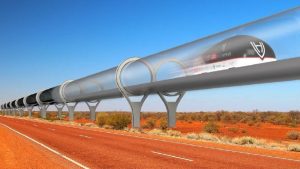
Since the ancient time, humans have always had the urge to move and go over the distance for many kinds of purposes. With their intelligence, humans keep trying to make this move better and more effective each time. This is what we call the innovations in the field of transport and it started with the simpler means like horse-drawn carriages, sailing-ships, zeppelins, and many more to cars, bullet trains, motor boats, and airplanes. If you go to Japan, you can find shinkansen, a network of high-speed railway lines. There is something similar plans to appear in Saint Petersburg, Russia, called Hyperloop. We will talk more about it soon.
TheTransportation in Russia
The effectiveness of the national economy, economic growth, and the sustainability of the development activity are largely determined by the functioning of transport. On one hand, this industry reflects the level of development of the national economy and its competitiveness, and on the other, the level of economic security of the country.
The Ministry of Transport of the Russian Federation supports initiatives aimed at strengthening further mutual cooperation, the development of transport corridors, innovative container and high-speed communications, and the creation of effective and efficient logistics systems. All this, ultimately, will contribute to increasing the competitiveness of the Russian transport system in regional and global transport markets, as well as the active implementation of new initiatives and projects supported at the highest state and international levels.
The sphere of innovation can be public transport – one of the most important economic sectors. One of the innovations in transport can be attributed to electric buses, which are already made into realization in the country. Electric buses in Russia are vehicles that are still classified as rare. The massive introduction of this eco-technology is hindered by startup costs and the payback period of equipment, which is significantly higher compared to traditional buses. The first Russian electric bus appeared at the beginning of the last century. Omnibuses, designed by an engineer named Romanov, transported residents of St. Petersburg along a dozen routes. The pioneer of the class of electric buses in Russia was the NefAZ-52992 model, released in 2012. For five years of operation of the equipment, it has fully proved its effectiveness. Today, electric buses are used in Moscow, St. Petersburg and Novosibirsk.
Russia believes that the innovations in the field of transportation must include the following points into consideration:
- The development of the vehicles (drive systems, materials, design, etc.);
- The creation and development of infrastructure (construction of new road networks, optimization of road capacity, as well as the use of advanced information and communication technologies, etc.);
- The implementation of transport services.
The Hyperloop
Having all of the things mentioned above in mind, Russia plans to add another type of modern mean of mass transport called Hyperloop is projected to operate in 2030. It is a vacuum train project proposed in 2013 by the American venture entrepreneur Elon Musk who is also the founder of Tesla – a globally known electric car manufacturer. To date, two test sites have been built in Hawthorne and Las Vegas with the maximum speed achieved in the tests about 450-460 km/h. According to Musk, this is something between the Concord, the railgun and the air hockey table. Hyperloop is conceived as an elevated supported pipeline, inside of which – at a speed of 480 to 1220 km/h (depending on the landscape) with an interval of 30 seconds – single transport capsules with the length of 25-30 meters are moved in one direction.
Implementation of Hyperloop in Russia
Russia became one of the countries in the world that were interested in the Hyperloop. In 2016, Mayor of Moscow, Sergei Sobyanin, Hyperloop One co-founder Sherwin Pishevar and Russian investor Ziyavudin Magomedov agreed to build Hyperloop in Moscow and signed a memorandum of cooperation. Hyperloop One is the American transportation technology company that is responsible in promoting and handling all contracts of Hyperloop. Magomedov is said to have secured a total investment of 90 million US dollars with the company. In October 2016, Magomedov joined the Hyperloop One Board of Directors.
Magomedov eagerly talks about the implementation of the Hyperloop project, including in Russia. In an interview with Forbes, he talked about the prospects of freight transportation using a new mode of transport, the possibility of replacing steel with composite materials and a significant reduction in the cost of technology, as well as the prospect of accelerating Hyperloop to 2,000 kilometers per hour. The businessman estimated the cost of building the Hyperloop highway at 12-15 million dollars per kilometer in both directions. Obviously, he was very attracted to the idea of implementing the Hyperloop project in Russia.
He also, for example, voiced the prospect of building a new Silk Road using this technology – from China to Europe through Kazakhstan and Russia. In the near future, Magomedov projects the construction of 65 kilometers of the route from the port of Zarubino (Primorsky Krai) to Hunchun (China), as well as the route between St. Petersburg – Moscow. The trip between the two big cities by Hyperloop should last 36 minutes. It was also planned that Hyperloop One will begin to build the first existing vacuum train tracks in 2021.
Although a part of Russia is enthusiastic about this whole new idea of having a faster mass transportation in the country, not a few are pessimistic and considering it too expensive to be implemented. They believe that the people in Russia are fine with the means of transportation they have today since the number of the citizen in the country is not as big as in China, for example. So the need of rapidly moving them from one point and another doesn’t actually really call for something as futuristic as the Hyperloop. However, we shall see in 2030 – maybe this innovation of modern transportation will really happen in Russia.
